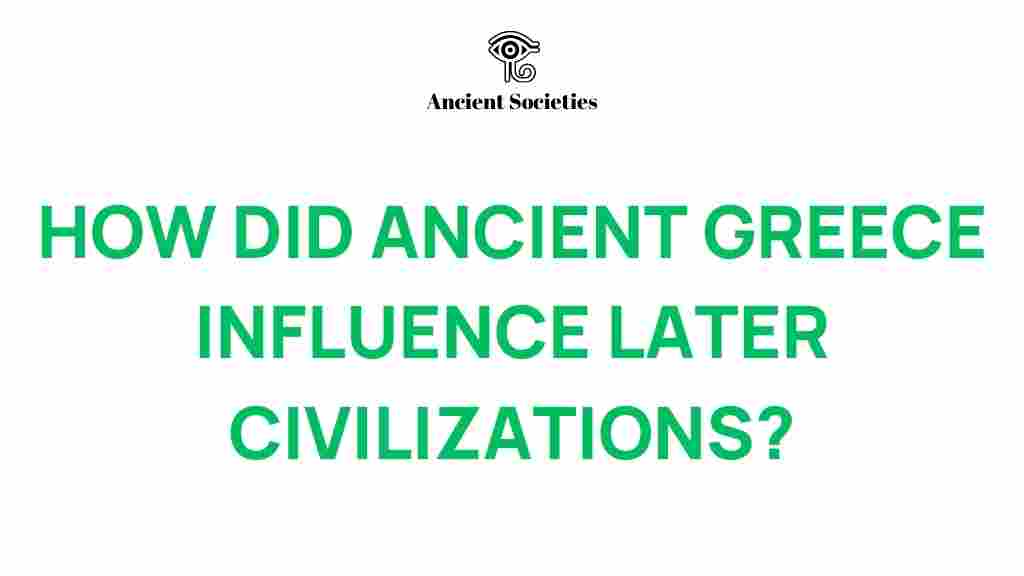Ancient Greece: A Civilization That Shaped Modern Societies
The impact of Ancient Greece on modern societies is profound and far-reaching. Known for its remarkable contributions to culture, philosophy, democracy, architecture, and art, this ancient civilization has laid the groundwork for various aspects of contemporary life. In this article, we will explore the enduring legacy of Ancient Greece, examining how its principles continue to influence our society today.
The Foundations of Ancient Greek Civilization
Emerging around the 8th century BC, the civilization of Ancient Greece was characterized by its city-states, known as *poleis*. Each city-state had its own government and way of life, which fostered a spirit of competition and innovation.
- Athens: The birthplace of democracy.
- Sparta: Renowned for its military prowess.
- Corinth: A hub of trade and commerce.
This diversity contributed to a rich tapestry of ideas and cultural practices that would later influence the Roman Empire and beyond.
Philosophy: The Intellectual Legacy
One of the most significant contributions of Ancient Greece is its philosophical traditions. Great thinkers such as Socrates, Plato, and Aristotle laid the foundations for Western philosophy, exploring concepts of ethics, politics, and metaphysics.
**Key Philosophical Contributions Include:**
- Socratic Method: A form of cooperative argumentative dialogue.
- Platonic Ideals: The theory of forms, which emphasizes the distinction between the material world and the world of ideas.
- Aristotelian Logic: The foundational principles of deductive reasoning.
These philosophical concepts continue to be taught in modern educational systems, influencing fields such as political science, ethics, and logic.
The Birth of Democracy
Ancient Greece is often hailed as the birthplace of democracy, particularly in Athens. The Athenian model of direct democracy allowed citizens to participate in decision-making, a radical idea at the time.
**Key Features of Athenian Democracy:**
- Citizenship was limited to free adult males.
- Public office was often filled by lottery.
- Assemblies were held to discuss and vote on major issues.
This early form of democracy has inspired modern democratic systems around the world, emphasizing the importance of civic engagement and the voice of the people.
Architectural Innovations
The architectural achievements of Ancient Greece are celebrated for their beauty and ingenuity. Structures such as the Parthenon and the Temple of Zeus exemplify the use of columns and symmetry that have influenced Western architecture.
**Key Architectural Contributions Include:**
- Columns: The Doric, Ionic, and Corinthian styles.
- Public Spaces: The Agora, which served as a marketplace and civic center.
- Theater: The development of open-air theaters for dramatic performances.
Many modern buildings draw inspiration from these ancient designs, showcasing the lasting impact of Greek architecture on urban landscapes worldwide.
A Legacy in Art and Culture
The art of Ancient Greece reflects the civilization’s values, beliefs, and aesthetics. From pottery to sculpture, Greek art is characterized by its attention to detail and human form.
**Notable Art Forms Include:**
- Vase Painting: Depicting mythological scenes and daily life.
- Sculpture: Statues of gods, athletes, and notable figures, often in marble.
- Theater: Dramatic works by playwrights like Sophocles and Euripides.
The themes explored in Greek art and theater continue to resonate, influencing modern literature, film, and visual arts. For a deeper dive into Greek art, you can visit this comprehensive resource.
The Role of Mythology
Mythology played a crucial role in shaping Ancient Greek culture, providing explanations for natural phenomena, human behavior, and societal values. The pantheon of gods and goddesses, such as Zeus, Athena, and Apollo, were integral to Greek religion and daily life.
**Myths and Their Significance:**
- They served as moral lessons.
- They provided a shared cultural identity.
- They influenced art, literature, and religion.
The stories of Greek mythology continue to be retold and adapted in various forms of media, showcasing their timeless relevance.
Influence on Modern Society
The legacy of Ancient Greece permeates many aspects of modern life:
- Education: The Socratic method is still prominent in teaching.
- Government: Many democratic principles are rooted in Athenian practices.
- Legal Systems: Concepts of justice and citizenship trace back to Greek ideals.
- Art and Literature: The themes explored by ancient playwrights continue to inspire contemporary works.
In essence, the principles and ideas developed in Ancient Greece have laid the groundwork for much of Western thought and modern governance.
Troubleshooting Common Misconceptions
Despite the clear influence of Ancient Greece, several misconceptions persist:
- Myth vs. Reality: Many believe myths are merely stories without real significance. In truth, they shaped cultural values.
- Democracy for All: While Athens pioneered democracy, it was exclusive. Understanding its limitations is crucial.
- Static Culture: People often view Greek culture as unchanging, but it evolved significantly over time.
Addressing these misconceptions helps us appreciate the complexity and richness of Ancient Greek civilization.
Conclusion: The Lasting Legacy of Ancient Greece
In conclusion, the enduring legacy of Ancient Greece is evident in many facets of modern society. From its revolutionary ideas in philosophy and democracy to its stunning architecture and evocative art, the influence of this ancient civilization continues to shape our world today. As we look to the future, it is essential to recognize and appreciate the profound impact that Ancient Greece has had on our collective history and culture.
For further exploration of how Ancient Greece continues to influence contemporary life, check out this informative article.
This article is in the category History and created by AncientSocieties Team
